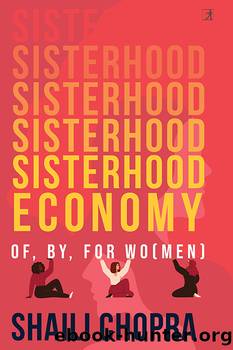Sisterhood Economy by Shaili Chopra

Author:Shaili Chopra
Language: eng
Format: epub
Publisher: S&S India
Published: 2022-08-15T00:00:00+00:00
Role of Mothers
Mothers not only care for their children by nurturing, feeding, bathing and clothing them, but also by protecting them. When they are in a position to do so, women also direct household resources to the care and upbringing of their children. Studies in a variety of low-income settings have shown that where women are income earners, they are more likely than men to spend their earnings on goods and services that benefit the household, e.g., food, education, and medicine.
To be more precise, if changes in policies and mindsets of the society are implemented to improve womenâs health, womenâs participation in education and employment will also increase. Not only do mothers need health support but they can become the reason why millions of girls prioritise their health.
Mental health was never heard of in Sunita Guptaâs life until she was diagnosed with it. Sunita, who lives in Dehri-on-Sone, a small town in Bihar, faced a lot of problems and stigmas to speak up and demand treatment for her illness which was an advanced level of obsessive-compulsive disorder and depression. Her family never thought that women can be affected by mental health disorders or that there was an illness like that. Sunitaâs husband too took time to understand that his wife needed psychiatric help. But he stood up and provided care and support. Later, when Kamala Gupta was diagnosed with major depression and psychosis, it was her mother, Sunita, who identified the symptoms first and stirred the discussion of seeking psychiatric help for her daughter.
Sunita and Kamlaâs story tell us that mothers not only should take care of their own bodies and health but also encourage their daughters to seek medical help for any discomfort. It is said that educated and empowered mothers raise empowered daughters; similarly, a mother who is well aware of womenâs health issues carries the responsibility of educating her daughters about the importance of medical health. It is not a hidden fact that mothers or women generally internalise the lack of importance and awareness about their health. So changing their mindset is crucial to developing a society of healthy women. Mothers are the caregivers. But the caregiving should not be limited to the male members of the family. It should include the mothers themselves and the daughters.
If society prioritises womenâs health, it will contribute to increasing the literacy rate within a country and on the global index. Healthy women will seek better education opportunities and vice versa. A study shows that 52% of girls in India are absent in schools due to frequent illnesses. The most prominent illness among girls in India is related to the lack of menstruation hygiene. Twenty-three million women in India drop out of school when they begin menstruating.
Apart from menstruation, other chronic health problems affect women more than men because of the prevalent male-child preference culture in our society. Studies have shown how female patients are missing in healthcare centres. The ratio of male to female patients in states like Bihar is as high as 2.
Download
This site does not store any files on its server. We only index and link to content provided by other sites. Please contact the content providers to delete copyright contents if any and email us, we'll remove relevant links or contents immediately.
International Integration of the Brazilian Economy by Elias C. Grivoyannis(106928)
The Radium Girls by Kate Moore(12001)
Turbulence by E. J. Noyes(8001)
Nudge - Improving Decisions about Health, Wealth, and Happiness by Thaler Sunstein(7678)
The Black Swan by Nassim Nicholas Taleb(7086)
Rich Dad Poor Dad by Robert T. Kiyosaki(6574)
Pioneering Portfolio Management by David F. Swensen(6269)
Man-made Catastrophes and Risk Information Concealment by Dmitry Chernov & Didier Sornette(5980)
Zero to One by Peter Thiel(5763)
Secrecy World by Jake Bernstein(4727)
Millionaire: The Philanderer, Gambler, and Duelist Who Invented Modern Finance by Janet Gleeson(4446)
The Age of Surveillance Capitalism by Shoshana Zuboff(4267)
Skin in the Game by Nassim Nicholas Taleb(4223)
The Money Culture by Michael Lewis(4173)
Bullshit Jobs by David Graeber(4161)
Skin in the Game: Hidden Asymmetries in Daily Life by Nassim Nicholas Taleb(3973)
The Dhandho Investor by Mohnish Pabrai(3741)
The Wisdom of Finance by Mihir Desai(3718)
Blockchain Basics by Daniel Drescher(3564)
